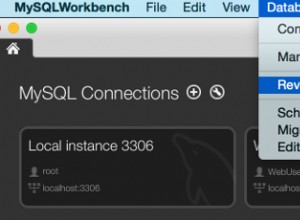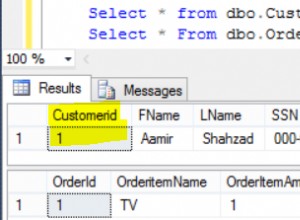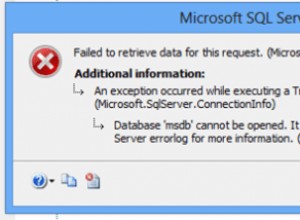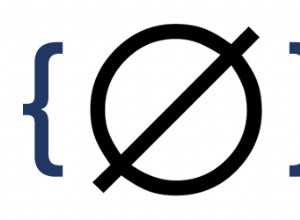Quello che ho fatto in progetti precedenti in cui avevo bisogno di fare la stessa cosa, ho aggiunto due nuove colonne.
- i_depth:valore int di quanto è profonda la categoria
- nvc_breadcrumb:percorso completo della categoria in un formato di tipo breadcrumb
E poi ho aggiunto un trigger alla tabella che contiene le informazioni sulla categoria per fare quanto segue (tutti e tre gli aggiornamenti sono nello stesso trigger)...
-- Reset all branches
UPDATE t_org_branches
SET nvc_breadcrumb = NULL,
i_depth = NULL
-- Update the root branches first
UPDATE t_org_branches
SET nvc_breadcrumb = '/',
i_depth = 0
WHERE guid_branch_parent_id IS NULL
-- Update the child branches on a loop
WHILE EXISTS (SELECT * FROM t_branches WHERE i_depth IS NULL)
UPDATE tobA
SET tobA.i_depth = tobB.i_depth + 1,
tobA.nvc_breadcrumb = tobB.nvc_breadcrumb + Ltrim(tobA.guid_branch_parent_id) + '/'
FROM t_org_branches AS tobA
INNER JOIN t_org_branches AS tobB ON (tobA.guid_branch_parent_id = tobB.guid_branch_id)
WHERE tobB.i_depth >= 0
AND tobB.nvc_breadcrumb IS NOT NULL
AND tobA.i_depth IS NULL
E poi fai un join con la tabella dei tuoi prodotti sull'ID categoria e fai un "LIKE '%/[CATEGORYID]/%'". Tieni presente che questo è stato fatto in MS SQL, ma dovrebbe essere abbastanza facile da tradurre in una versione di MySQL.
Potrebbe essere abbastanza compatibile per un taglia e incolla (dopo la modifica del nome della tabella e della colonna).
Ampliamento della spiegazione...
t_categories (così com'è ora)...
Cat Parent CategoryName
1 NULL MyStore
2 1 Electronics
3 1 Clothing
4 1 Books
5 2 Televisions
6 2 Stereos
7 5 Plasma
8 5 LCD
t_categories (dopo la modifica)...
Cat Parent CategoryName Depth Breadcrumb
1 NULL MyStore NULL NULL
2 1 Electronics NULL NULL
3 1 Clothing NULL NULL
4 1 Books NULL NULL
5 2 Televisions NULL NULL
6 2 Stereos NULL NULL
7 5 Plasma NULL NULL
8 5 LCD NULL NULL
t_categories (dopo l'uso dello script che ho fornito)
Cat Parent CategoryName Depth Breadcrumb
1 NULL MyStore 0 /
2 1 Electronics 1 /1/
3 1 Clothing 1 /1/
4 1 Books 1 /1/
5 2 Televisions 2 /1/2/
6 2 Stereos 2 /1/2/
7 5 LCD 3 /1/2/5/
8 7 Samsung 4 /1/2/5/7/
t_products (come ce l'hai adesso, nessuna modifica)...
ID Cat Name
1 8 Samsung LNT5271F
2 7 LCD TV mount, up to 36"
3 7 LCD TV mount, up to 52"
4 5 HDMI Cable, 6ft
Unisciti a categorie e prodotti (dove le categorie è C, i prodotti è P)
C.Cat Parent CategoryName Depth Breadcrumb ID p.Cat Name
1 NULL MyStore 0 / NULL NULL NULL
2 1 Electronics 1 /1/ NULL NULL NULL
3 1 Clothing 1 /1/ NULL NULL NULL
4 1 Books 1 /1/ NULL NULL NULL
5 2 Televisions 2 /1/2/ 4 5 HDMI Cable, 6ft
6 2 Stereos 2 /1/2/ NULL NULL NULL
7 5 LCD 3 /1/2/5/ 2 7 LCD TV mount, up to 36"
7 5 LCD 3 /1/2/5/ 3 7 LCD TV mount, up to 52"
8 7 Samsung 4 /1/2/5/7/ 1 8 Samsung LNT5271F
Ora supponendo che la tabella dei prodotti fosse più completa in modo che ci siano elementi in ogni categoria e nessun NULL, puoi fare un "Breadcrumb LIKE '%/5/%'" per ottenere gli ultimi tre elementi dell'ultima tabella che ho fornito. Si noti che include gli articoli diretti e i bambini della categoria (come la tv Samsung). Se vuoi SOLO gli articoli della categoria specifica, fai semplicemente un "c.cat =5".




